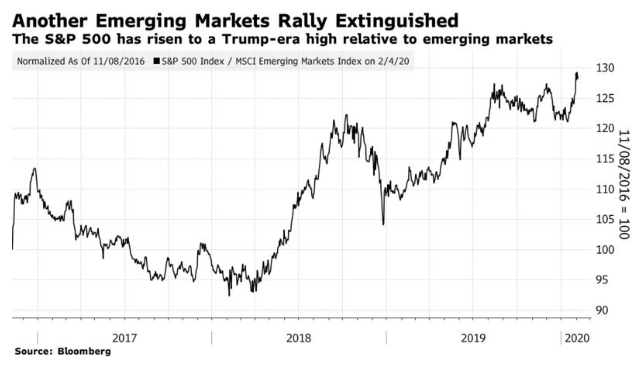Within stock markets, MSCI’s index of the 100 companies within its world index that have the greatest exposure to China makes clear that this is still being treated as a Chinese event. It will have a drastic effect on the Chinese economy, the logic goes, but not on others. This is strange logic given the size of China and its importance to the rest of the world, but at present that is the working assumption:
To view this another way, this is how the S&P 500 has fared compared to the MSCI emerging markets index since Trump was elected. Emerging markets were beginning to make up lost ground at the end of last year, thanks to improving sentiment surrounding the trade conflict between the U.S. and China. That is all over now, and the S&P is at a fresh high relative to emerging markets for the Trump presidency.
There is a problem with all of this, which is that flows seeking a haven tend to strengthen the dollar, which weakens the U.S. trading position. But the Federal Reserve will now, it is thought, feel obliged to loosen monetary policy still further in the face of the epidemic. Meanwhile, the virus, the damage it has done to China’s economy, and the widespread perception that officials concealed the epidemic from the rest of the world, will all serve to weaken the country’s negotiating position in ongoing trade talks. The U.S. is already prepared to levy tariffs in retaliation against currency manipulation, in a clear sign of confidence.
Put all this together and we have a revival delivered by the malign agency of a new epidemic. There are risks. The stock market could overheat. The virus could damage China’s economy so greatly that it brings the rest of the world down with it. Or it could spread into the U.S. The complacent attitude embodied by the gains in the stock market is alarming.
But for now, the coronavirus has helped engineer a great comeback for American markets.
This article was provided by Bloomberg News.


Trump Is Winning Like A Napoleonic General
February 5, 2020
« Previous Article
| Next Article »
Login in order to post a comment








